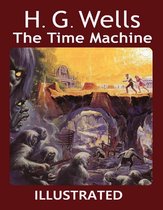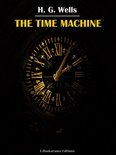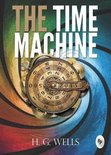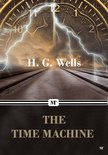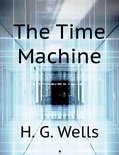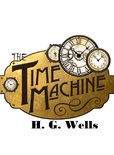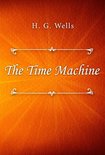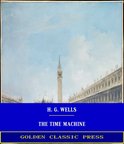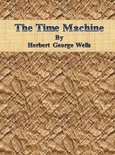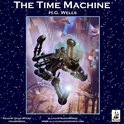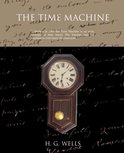The Time Machine Ebook Tooltip Ebooks kunnen worden gelezen op uw computer en op daarvoor geschikte e-readers.
Afbeeldingen
Sla de afbeeldingen overArtikel vergelijken
- Engels
- E-book
- 1230003675670
- 21 januari 2020
- Epub zonder kopieerbeveiliging (DRM)
Samenvatting
The Time Machine is a science fiction novella by H. G. Wells, published in 1895 and written as a frame narrative. The work is generally credited with the popularization of the concept of time travel by using a vehicle or device to travel purposely and selectively forward or backward through time. The term "time machine", coined by Wells, is now almost universally used to refer to such a vehicle or device.
The Time Machine has been adapted into three feature films of the same name, as well as two television versions and many comic book adaptations. It has also indirectly inspired many more works of fiction in many media productions.
Wells had considered the notion of time travel before, in a short story titled "The Chronic Argonauts" (1888). This work, published in his college newspaper, was the foundation for The Time Machine.
Wells frequently stated that he had thought of using some of this material in a series of articles in the Pall Mall Gazette until the publisher asked him if he could instead write a serial novel on the same theme. Wells readily agreed and was paid on its publication by Heinemann in 1895, which first published the story in serial form in the January to May numbers of The New Review (newly under the nominal editorship of W. E. Henley). Henry Holt and Company published the first book edition (possibly prepared from a different manuscript) on 7 May 1895; Heinemann published an English edition on 29 May. These two editions are different textually and are commonly referred to as the "Holt text" and "Heinemann text", respectively. Nearly all modern reprints reproduce the Heinemann text.
The story reflects Wells's own socialist political views, his view on life and abundance, and the contemporary angst about industrial relations. It is also influenced by Ray Lankester's theories about social degeneration and shares many elements with Edward Bulwer-Lytton's novel Vril, the Power of the Coming Race (1871). Other science fiction works of the period, including Edward Bellamy's novel Looking Backward: 2000-1887 (1888) and the later film Metropolis (1927), dealt with similar themes.
Based on Wells's personal experiences and childhood, the working class literally spent a lot of their time underground. His own family would spend most of their time in a dark basement kitchen when not being occupied in their father's shop. Later, his own mother would work as a housekeeper in a house with tunnels below, where the staff and servants lived in underground quarters. A medical journal published in 1905 would focus on these living quarters for servants in poorly ventilated dark basements. In his early teens, Wells became a draper's apprentice, having to work in a basement for hours on end.
This work is an early example of the Dying Earth sub genre. The portion of the novella that sees the Time Traveler in a distant future where the sun is huge and red also places The Time Machine within the realm of eschatology, i.e. the study of the end times, the end of the world, and the ultimate destiny of humankind. Source: Wikipedia
About Author:
Herbert George Wells (21 September 1866 – 13 August 1946) was an English writer. He was prolific in many genres, writing dozens of novels, short stories, and works of social commentary, history, satire, biography, and autobiography, and even including two books on recreational war games. He is now best remembered for his science fiction novels and is often called the "father of science fiction", along with Jules Verne and the publisher Hugo Gernsback.
During his own lifetime, however, he was most prominent as a forward-looking, even prophetic social critic who devoted his literary talents to the development of a progressive vision on a global scale. A futurist, he wrote a number of utopian works and foresaw the advent of aircraft, tanks, space travel, nuclear weapons, satellite television and something resembling the World Wide Web. His science fiction imagined time travel, alien invasion, invisibility, and biological engineering. Brian Aldiss referred to Wells as the "Shakespeare of science fiction". Wells rendered his works convincing by instilling commonplace detail alongside a single extraordinary assumption – dubbed “Wells’s law” – leading Joseph Conrad to hail him in 1898 as "O Realist of the Fantastic!". His most notable science fiction works include The Time Machine (1895), The Island of Doctor Moreau (1896), The Invisible Man (1897), The War of the Worlds (1898) and the military science fiction The War in the Air (1907). Wells was nominated for the Nobel Prize in Literature four times.
Wells's earliest specialised training was in biology, and his thinking on ethical matters took place in a specifically and fundamentally Darwinian context. He was also from an early date an outspoken socialist, often (but not always, as at the beginning of the First World War) sympathising with pacifist views. His later works became increasingly political and didactic, and he wrote little science fiction, while he sometimes indicated on official documents that his profession was that of journalist. Novels such as Kipps and The History of Mr Polly, which describe lower-middle-class life, led to the suggestion that he was a worthy successor to Charles Dickens, but Wells described a range of social strata and even attempted, in Tono-Bungay (1909), a diagnosis of English society as a whole. Wells was a diabetic and co-founded the charity The Diabetic Association (known today as Diabetes UK) in 1934.
Herbert George Wells was born at Atlas House, 162 High Street in Bromley, Kent, on 21 September 1866. Called "Bertie" in the family, he was the fourth and last child of Joseph Wells (a former domestic gardener, and at the time a shopkeeper and professional cricketer) and his wife, Sarah Neal (a former domestic servant). An inheritance had allowed the family to acquire a shop in which they sold china and sporting goods, although it failed to prosper: the stock was old and worn out, and the location was poor. Joseph Wells managed to earn a meagre income, but little of it came from the shop and he received an unsteady amount of money from playing professional cricket for the Kent county team. Payment for skilled bowlers and batsmen came from voluntary donations afterwards, or from small payments from the clubs where matches were played.
A defining incident of young Wells's life was an accident in 1874 that left him bedridden with a broken leg. To pass the time he began to read books from the local library, brought to him by his father. He soon became devoted to the other worlds and lives to which books gave him access; they also stimulated his desire to write. Later that year he entered Thomas Morley's Commercial Academy, a private school founded in 1849, following the bankruptcy of Morley's earlier school. The teaching was erratic, the curriculum mostly focused, Wells later said, on producing copperplate handwriting and doing the sort of sums useful to tradesmen. Wells continued at Morley's Academy until 1880. In 1877, his father, Joseph Wells, suffered a fractured thigh. The accident effectively put an end to Joseph's career as a cricketer, and his subsequent earnings as a shopkeeper were not enough to compensate for the loss of the primary source of family income.
Wells spent the winter of 1887-88 convalescing at Uppark, where his mother, Sarah, was housekeeper.
No longer able to support themselves financially, the family instead sought to place their sons as apprentices in various occupations. From 1880 to 1883, Wells had an unhappy apprenticeship as a draper at the Southsea Drapery Emporium, Hyde's. His experiences at Hyde's, where he worked a thirteen-hour day and slept in a dormitory with other apprentices, later inspired his novels The Wheels of Chance, The History of Mr Polly, and Kipps, which portray the life of a draper's apprentice as well as providing a critique of society's distribution of wealth.
Wells's parents had a turbulent marriage, owing primarily to his mother's being a Protestant and his father's being a freethinker. When his mother returned to work as a lady's maid (at Uppark, a country house in Sussex), one of the conditions of work was that she would not be permitted to have living space for her husband and children. Thereafter, she and Joseph lived separate lives, though they never divorced and remained faithful to each other. As a consequence, Herbert's personal troubles increased as he subsequently failed as a draper and also, later, as a chemist's assistant. However, Uppark had a magnificent library in which he immersed himself, reading many classic works, including Plato's Republic, Thomas More's Utopia, and the works of Daniel Defoe. This was the beginning of Wells's venture into literature. Source: Wikipedia
Productspecificaties
Inhoud
- Taal
- en
- Bindwijze
- E-book
- Oorspronkelijke releasedatum
- 21 januari 2020
- Ebook Formaat
- Epub zonder kopieerbeveiliging (DRM)
- Illustraties
- Nee
Betrokkenen
- Hoofdauteur
- H G Wells
- Tweede Auteur
- H G Wells
- Co Auteur
- H. G. Wells
- Hoofdillustrator
- Felix Bennett
- Tweede Illustrator
- Tod Smith
- Hoofdredacteur
- Clark Madison
- Hoofduitgeverij
- Sanjiv Makkar
Lees mogelijkheden
- Lees dit ebook op
- Android (smartphone en tablet) | Kobo e-reader | Desktop (Mac en Windows) | iOS (smartphone en tablet) | Windows (smartphone en tablet)
Overige kenmerken
- Studieboek
- Nee
EAN
- EAN
- 1230003675670
Je vindt dit artikel in
- Taal
- Engels
- Boek, ebook of luisterboek?
- Ebook
- Beschikbaarheid
- Leverbaar
- Beschikbaar in Kobo Plus
- Beschikbaar in Kobo Plus
Waarom een wereldbollabel?
Artikelen met een wereldbol bezitten positieve eigenschappen vergeleken met soortgelijke artikelen, zoals bepaalde keur- of kenmerken op sociaal en ecologisch gebied.
Keur- of kenmerken
-
Digitaal boek
Onafhankelijk onderzoek toont aan dat als je meer dan 25 ebooks downloadt, dit een lagere milieuimpact heeft dan van fysieke boeken.
Kies gewenste uitvoering
Prijsinformatie en bestellen
De prijs van dit product is 5 euro en 89 cent.- E-book is direct beschikbaar na aankoop
- E-books lezen is voordelig
- Dag en nacht klantenservice
- Veilig betalen
Alle bindwijzen en edities (37)
-
0,49Direct beschikbaar
-
2,46Direct beschikbaar
-
0,97Direct beschikbaar
-
5,89Direct beschikbaar
-
0,99Direct beschikbaar
-
0,97Direct beschikbaar
-
1,99Direct beschikbaar
-
1,99Direct beschikbaar
-
1,49Direct beschikbaar
-
0,97Direct beschikbaar
-
0,99Direct beschikbaar
-
2,99Direct beschikbaar
-
0,99Direct beschikbaar
-
0,99Direct beschikbaar
-
5,88Direct beschikbaar
-
2,99Direct beschikbaar
-
0,97Direct beschikbaar
-
1,00Direct beschikbaar
-
2,95Direct beschikbaar
-
2,94Direct beschikbaar
-
0,49Direct beschikbaar
-
0,97Direct beschikbaar
-
1,99Direct beschikbaar
-
0,49Direct beschikbaar
-
2,99Direct beschikbaar
-
1,99Direct beschikbaar
-
1,49Direct beschikbaar
-
6,99Direct beschikbaar
-
17,99Direct beschikbaar
-
2,99Direct beschikbaar
-
11,99Direct beschikbaar
-
9,992 - 3 weken
Levertijd
We doen er alles aan om dit artikel op tijd te bezorgen. Het is echter in een enkel geval mogelijk dat door omstandigheden de bezorging vertraagd is.
Bezorgopties
We bieden verschillende opties aan voor het bezorgen of ophalen van je bestelling. Welke opties voor jouw bestelling beschikbaar zijn, zie je bij het afronden van de bestelling.
Tooltip -
12,992 - 3 weken
Levertijd
We doen er alles aan om dit artikel op tijd te bezorgen. Het is echter in een enkel geval mogelijk dat door omstandigheden de bezorging vertraagd is.
Bezorgopties
We bieden verschillende opties aan voor het bezorgen of ophalen van je bestelling. Welke opties voor jouw bestelling beschikbaar zijn, zie je bij het afronden van de bestelling.
Tooltip -
17,992 - 3 weken
Levertijd
We doen er alles aan om dit artikel op tijd te bezorgen. Het is echter in een enkel geval mogelijk dat door omstandigheden de bezorging vertraagd is.
Bezorgopties
We bieden verschillende opties aan voor het bezorgen of ophalen van je bestelling. Welke opties voor jouw bestelling beschikbaar zijn, zie je bij het afronden van de bestelling.
Tooltip -
8,992 - 3 weken
Levertijd
We doen er alles aan om dit artikel op tijd te bezorgen. Het is echter in een enkel geval mogelijk dat door omstandigheden de bezorging vertraagd is.
Bezorgopties
We bieden verschillende opties aan voor het bezorgen of ophalen van je bestelling. Welke opties voor jouw bestelling beschikbaar zijn, zie je bij het afronden van de bestelling.
Tooltip -
7,99Op voorraad. Voor 23:59 besteld, morgen in huis
Levertijd
We doen er alles aan om dit artikel op tijd te bezorgen. Het is echter in een enkel geval mogelijk dat door omstandigheden de bezorging vertraagd is.
Bezorgopties
We bieden verschillende opties aan voor het bezorgen of ophalen van je bestelling. Welke opties voor jouw bestelling beschikbaar zijn, zie je bij het afronden van de bestelling.
Tooltip -
29,531 - 2 weken
Levertijd
We doen er alles aan om dit artikel op tijd te bezorgen. Het is echter in een enkel geval mogelijk dat door omstandigheden de bezorging vertraagd is.
Bezorgopties
We bieden verschillende opties aan voor het bezorgen of ophalen van je bestelling. Welke opties voor jouw bestelling beschikbaar zijn, zie je bij het afronden van de bestelling.
Tooltip
Rapporteer dit artikel
Je wilt melding doen van illegale inhoud over dit artikel:
- Ik wil melding doen als klant
- Ik wil melding doen als autoriteit of trusted flagger
- Ik wil melding doen als partner
- Ik wil melding doen als merkhouder
Geen klant, autoriteit, trusted flagger, merkhouder of partner? Gebruik dan onderstaande link om melding te doen.





